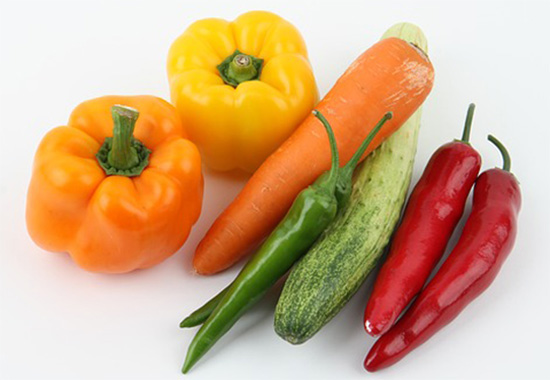|

Vegetables, especially green vegetables, hold an
important place in the diet, because they contain varying proportions
of vitamines (such as Vitamin A, Vitamin K, Vitamin B6 etc), enzymes,
carbohydrates, provitamins, and valuable mineral
matter. The nutritional content of vegetables varies considerably,
though generally they contain little protein or fat. Some vegetables
also contain fiber, important for gastrointestinal function.
Vegetables contain a great variety of other phytochemicals, some of which have been claimed to have antioxidant, antibacterial, antifungal, antiviral and anticarcinogenic properties. They also contain a high percentage of water and
considerable cellulose. Some vegetables contain important nutrients necessary for healthy
hair and skin as well.
However, vegetables often also contain toxins and
antinutrients such as α-solanine, α-chaconine, enzyme inhibitors (of
cholinesterase, protease, amylase, etc.), cyanide and cyanide
precursors, oxalic acid, and more. Depending on the concentration, such
compounds may reduce the edibility, nutritional value, and health
benefits of dietary vegetables. Cooking and/or other processing may be
necessary to eliminate or reduce them.
In culinary terms, a vegetable is an edible plant or its part,
intended for cooking or eating raw. They are eaten in a variety of
ways, as part of main meals and as snacks. With few exceptions most
vegetables should be lightly steamed for short time or eaten
raw, because the water-soluble nutrients and mineral salts, being
soluble, are lost in the
water in which they are cooked and because the cellulose serves its
purpose best in the crisp form.
Browse Recipes & Related Information:
 Pizza Potatoes Pizza Potatoes
 Boiled Carrots Boiled Carrots
 Stuffed Beets Stuffed Beets
 Stuffed Eggplant Stuffed Eggplant
 Jerusalem Artichokes Jerusalem Artichokes
 Bacon-Wrapped Asparagus Bacon-Wrapped Asparagus
 The Onion Story The Onion Story
 Vegetarian Dishes Vegetarian Dishes
 Defining Powerhouse Fruits & Vegetables: A Nutrient Density Approach Defining Powerhouse Fruits & Vegetables: A Nutrient Density Approach
 Tasty Veggie Triangles Tasty Veggie Triangles
 Tomatoes the Best Source of Lycopene Tomatoes the Best Source of Lycopene
 Powerful Leafy Green Vegetables Powerful Leafy Green Vegetables
Did You Know?
All fluids and tissues of the body contain
large quantities of water, therefore water is regarded as one of
the most important foodstuffs required by the body.
Practically
all foods contain some water. Fresh vegetables and fruits provide
the body with a high percentage of water.
Diets containing recommended amounts of fruits and vegetables may help lower the risk of heart diseases and type 2 diabetes. These diets may also protect against some cancers and decrease bone loss. The potassium provided
by both vegetables and fruits may help prevent the formation of kidney
stones.
The word "vegetarian" is not derived from "vegetable," but from the
Latin, homo vegetus, meaning among the Romans a strong, robust,
thoroughly healthy man.
A person who refrains from dairy and meat
products, and eats only plants (including vegetables) is known as a vegan.
|







